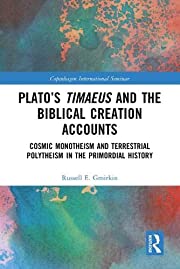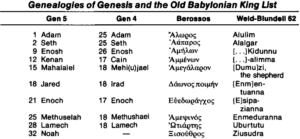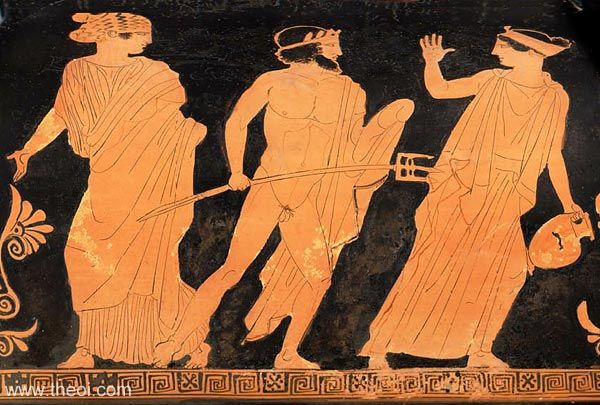
Continuing the series discussing Russell Gmirkin’s Plato’s Timaeus and the Biblical Creation Accounts . . . .
The expulsion of Adam and Eve from the Garden in Eden (note, not expelled from the land of Eden but only from Eden’s Garden) generally coincides with the Greek mythological Age of Zeus that succeeded the idyllic golden age of Kronos:
The proliferation of cities, kings and technology broadly conforms to the rise of civilization and self-sufficiency in the Age of Zeus in Greek sources from Hesiod to Plato. (Gmirkin, 210)
So let’s recap with Hesiod’s poem Works and Days:
The gods desire to keep the stuff of life
Hidden from us. If they did not, you could
Work for a day and earn a year’s supplies;
You’d pack away your rudder, and retire
The oxen and the labouring mules. But Zeus
Concealed the secret, angry in his heart
At being hoodwinked by Prometheus,
And so he thought of painful cares for men. (lines 42ff)
Hesiod wrote of the change Zeus sent through Pandora:
Before this time men lived upon the earth
Apart from sorrow and from painful work,
Free from disease, which brings the Death-gods in.
But now the woman opened up the cask,
And scattered pains and evils among men.
Inside the cask’s hard walls remained one thing,
Hope, only, which did not fly through the door.
The lid stopped her, but all the others flew,
Thousands of troubles, wandering the earth.
The earth is full of evils, and the sea.
Diseases come to visit men by day
And, uninvited, come again at night
Bringing their pains in silence, for they were
Deprived of speech by Zeus the Wise. And so
There is no way to flee the mind of Zeus. (lines 90ff)
Hesiod pictured successive races, each having to suffer more than the previous one:
Far-seeing Zeus then made another race,
The fifth, who live now on the fertile earth.
I wish I were not of this race, that I
Had died before, or had not yet been born.
This is the race of iron. Now, by day,
Men work and grieve unceasingly; by night,
They waste away and die. The gods will give
Harsh burdens, but will mingle in some good. (lines 196ff)
Hesiod addresses his instruction to a nobleman, Perses, appropriately given that the nobility saw themselves as direct descendants of Zeus:
O noble Perses [literally, “Perses, of the genus of the gods], keep my words in mind,
And work till Hunger is your enemy
And till Demeter, awesome, garlanded,
Becomes your friend and fills your granary.
For Hunger always loves a lazy man. (lines 299ff)
And so Adam was charged with the toil and hardship to survive:
Cursed is the ground for your sake;
In toil you shall eat of it
All the days of your life.
Both thorns and thistles it shall bring forth for you,
And you shall eat the herb of the field.
In the sweat of your face you shall eat bread (Gen 3:17-19)
Moving ahead to Cain’s exile from the land of Eden, we cover here chapters 4 to 6 that are each widely understood to be derived from different source material. In chapter 4 Gmirkin identifies Plato’s broad narrative framework although the detail of the text originated elsewhere.
Genesis 4
With Genesis 5 we begin a new genealogy from Adam, the ten generations up to the Flood. Gmirkin first set out his case for this section being derived from the Hellenistic era author, Berossus in Berossus and Genesis, Manetho and Exodus. While Mesopotamian years for each pre-flood generation was measured in the tens of thousands (totalling approximately two hundred thousand years) Plato spoke of a beginning closer to ten thousand years before his time, and a calculation of the Bible’s beginnings are shorter still.
The most that can be inferred from Genesis itself is that the Primordial History is set a few thousand years in the past, approximately in line with contemporary Greek theories. Although Genesis 5 also adopted a scheme of ten long-lived patriarchs before the flood, under the influence of the Babyloniaca of Berossus (Gmirkin 2006: 107-8), its chronological scheme is more in line with Greek than Mesopotamian estimates of the age of the world. (Gmirkin, 213)
Calculations for the time of creation vary, and the differences between the Hebrew and Septuagint versions are most pronounced. But those who are intrigued by the common calculation that Adam was created 1656 or 1657 years before the flood will be interested in how Cassuto relates this figure to the Mesopotamian methods of calculation:
Of the round numbers referred to, which are composed according to the sexagesimal system, one is 600,000—sixty myriads— a high figure that indicates an exceedingly large amount. Now 600,000 days make 1643 solar years of 365 days each. If we add seven plus seven, as was done in the case of Methuselah’s years, we obtain exactly 1657. We have here, then, a pattern similar to that of the Babylonian chronology: a number based on the sexagesimal principle with the addition of twice times seven. (Cassuto, 261)
Genesis 5
| Genesis 5
This is the book of the genealogy of Adam. In the day that God created man, He made him in the likeness of God. 2 He created them male and female, and blessed them and called them Mankind in the day they were created. 3 And Adam lived one hundred and thirty years, and begot a son in his own likeness, after his image, and named him Seth. 4 After he begot Seth, the days of Adam were eight hundred years; and he had sons and daughters. 5 So all the days that Adam lived were nine hundred and thirty years; and he died. 6 Seth lived one hundred and five years, and begot Enosh. 7 After he begot Enosh, Seth lived eight hundred and seven years, and had sons and daughters. 8 So all the days of Seth were nine hundred and twelve years; and he died. 9 Enosh lived ninety years, and begot [a]Cainan. 10 After he begot Cainan, Enosh lived eight hundred and fifteen years, and had sons and daughters. 11 So all the days of Enosh were nine hundred and five years; and he died. 12 Cainan lived seventy years, and begot Mahalalel. 13 After he begot Mahalalel, Cainan lived eight hundred and forty years, and had sons and daughters. 14 So all the days of Cainan were nine hundred and ten years; and he died. 15 Mahalalel lived sixty-five years, and begot Jared. 16 After he begot Jared, Mahalalel lived eight hundred and thirty years, and had sons and daughters. 17 So all the days of Mahalalel were eight hundred and ninety-five years; and he died. 18 Jared lived one hundred and sixty-two years, and begot Enoch. 19 After he begot Enoch, Jared lived eight hundred years, and had sons and daughters. 20 So all the days of Jared were nine hundred and sixty-two years; and he died. 21 Enoch lived sixty-five years, and begot Methuselah. 22 After he begot Methuselah, Enoch walked with God three hundred years, and had sons and daughters. 23 So all the days of Enoch were three hundred and sixty-five years. 24 And Enoch walked with God; and he was not, for God took him. 25 Methuselah lived one hundred and eighty-seven years, and begot Lamech. 26 After he begot Lamech, Methuselah lived seven hundred and eighty-two years, and had sons and daughters. 27 So all the days of Methuselah were nine hundred and sixty-nine years; and he died. 28 Lamech lived one hundred and eighty-two years, and had a son. 29 And he called his name Noah,[b] saying, “This one will comfort us concerning our work and the toil of our hands, because of the ground which the Lord has cursed.” 30 After he begot Noah, Lamech lived five hundred and ninety-five years, and had sons and daughters. 31 So all the days of Lamech were seven hundred and seventy-seven years; and he died. 32 And Noah was five hundred years old, and Noah begot Shem, Ham, and Japheth. |
Despite several of the same or similar names appearing in Genesis 4 and 5, in a different order (Westermann 1984: 348-9), it is noteworthy that no narrative connections were made with the seven generations of the line of Cain in Genesis 4, nor any attribution of important inventions to Seth’s descendants, nor any anecdotes regarding the growing violence of the pre-flood world. Genesis 4 and 5 thus appear to be independently authored narratives of the antediluvian world, linked only by the artificial coordination of these two accounts at Gen 4:25-26 (cf. Westermann 1984: 338). The names common to the two genealogies suggest they both made use of related antecedent source material whose character cannot now be recovered.
The narrative objective of Genesis 5 appears to be extremely limited: to give a detailed chronological framework for the antediluvian world. (Gmirkin, 211) |
 Westermann’s inability to consider the possibility that the author of Genesis was indebted to Berossus is evident when he wrote:
The Cassuto reference to which W. refers:
|

We have seen how Plato described the newly created earth being divided up among the various gods and goddesses, with each pair of deities appearing to create their own first humans from the dust of their respective allotted territory. Athena and Hephaestus gave their first humans of Attica or the city of Athens, divine forms of government, wisdom, crafts, prowess in war, and so forth. The god Poseidon was given the region beyond the Straits of Gibraltar, the land of Atlantis. Poseidon … well, read for yourself Plato’s account of what happened next…
